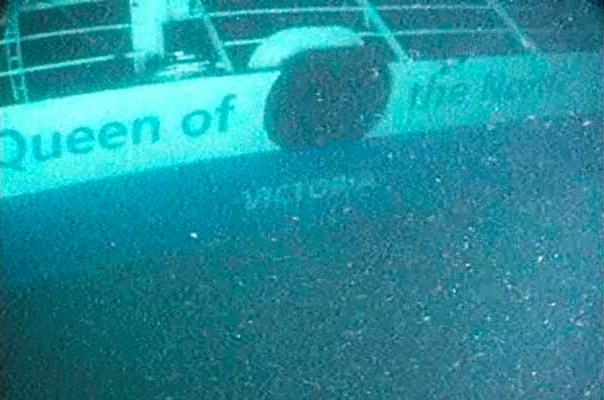VANCOUVER - The rescue operation to save passengers and crew on the Queen of the North as the ferry sank off the coast of British Columbia was faced with inconsistent information about how many people were on board and how many made it off alive, a criminal negligence trial heard Thursday.
The confusion persisted for hours, according to testimony at Karl Lilgert's criminal negligence trial, before rescue officials were able to confirm two passengers were unaccounted for.
Lilgert was the navigating officer when the Queen of the North struck an island and sank on March 22, 2006. He is charged with criminal negligence in the deaths of those two missing passengers.
Travis McNeice, a marine communications operator who was on duty in Prince Rupert that night, told the trial he and his colleagues spent hours attempting to confirm the number of passengers and crew and the number of survivors.
When the ferry struck Gil Island, shortly after midnight, the ship's crew reported, accurately, that there were 101 people on board. At some point that number jumped to 102, though it wasn't clear why.
Passengers and crew were pulled from life boats by fishing and rescue vessels, which took them to either the nearby First Nations village of Hartley Bay or the coast guard ship Sir Wilfrid Laurier.
McNeice and his colleagues received several radio calls from Hartley Bay and the Sir Wilfrid Laurier offering head counts of the survivors, but the numbers kept changing, he said.
"We started with 64 (on Hartley Bay), it went up to 65, and then we ended up with 63," McNeice testified.
"And on the Sir Wilfred Laurier, it stared at 37, then up to 38 and then back to 36."
McNeice and his colleagues were relaying that information to rescue co-ordinators at 91ԭ�� Forces Base Esquimalt, near Victoria.
It wasn't clear precisely when marine operators and rescue officials finally nailed down accurate tallies of passengers and survivors, but McNeice said when he finished his shift at 7 a.m. — more than six and a half hours after the crisis began — they had confirmed two people missing.
McNeice said he was never in contact with B.C. Ferries to see whether the company had an accurate passenger list. He wasn't sure whether anyone else from his office was, either.
He said it's normal to receive fluctuating numbers from a scene.
"In your experience, is that unusual or usual?" asked Crown lawyer Leslie Fillingham.
"It's not uncommon," replied McNeice.
The search continued throughout the following day, the trial has heard, before it was turned over to the RCMP as a missing person's case.
The two missing passengers, Gerald Foisy and Shirley Rosette, were never seen again and were presumed drowned.
Earlier this week, the trial heard audio recordings of radio broadcasts between the Queen of the North, marine operators and fishing vessels involved in the rescue.
Those broadcasts, which covered the first two hours of the rescue operation, also showed inconsistent head counts, with no one confident about whether everyone had made it off the ferry before it slipped below the water.
The recordings indicated there was no trouble reported from the bridge as the ferry sailed toward Gil Island after missing a critical turn.
Lilgert and his former lover, quartermaster Karen Bricker were alone together on the bridge at the time of the collision.
The Crown has argued Lilgert failed in his duties when he missed the course alteration, and then he failed to take any evasive actions before the ferry struck the island.
The defence has told the jury Lilgert's work has hampered by poor training, unreliable equipment and inadequate policies within BC Ferries. The system, not Lilgert, should be blamed for the crash, the defence has said.
Lilgert pleaded not guilty to two counts of criminal negligence causing death. His trial is expected to last up to six months.


